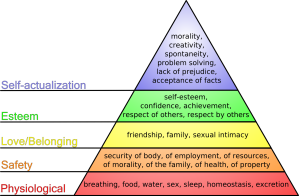Some time ago I wrote about post-materialism and it sparked a lot of interest. Some things have changed. My son has graduated and is struggling like most young people today. A generation that grew up believing they could do anything, be anything, is discovering that truth my generation sold them was wildly over-blown. Maybe even a lie. And a good lot of the twenty-somethings did everything we told them to. They went to college, got their degrees, took on debt when necessary, and tumbled full force into the real world. Young people with so much potential and so much to offer are stuck in minimum wage jobs, if they can get those. Many have bounced back home. Never have we seen so many twenty and thirty-somethings living in their parents’ basements. Never!!
This situation has become a topic I return to again and again, and it’s with a very heavy heart. I look at my daughter and son, friends, family, and neighbors where no one in this generation is thriving. Some are doing better than others, but when compared to the opportunity available to my parents and my own generation, it’s obvious it’s a different world. The recession is supposedly over and unemployment low. But we have not gone back to what we were, and sadly, we probably never will.
In the current reality, I think it bears asking is post-materialism valid? Valid only for a few?
Ronald Inglehart developed the idea of post materialism in the 1970s as a sociological theory to explain an ongoing transformation of individual values within a society. He argued that as western nations achieved a level of economic prosperity and physical security, its members transformed their values seeking more autonomy and self-expression. Ah, this sounds a lot like Maslow’s hierarchy of needs. As people meet their basic survival requirements, we move up the pyramid until we are striving for self-actualization. Maslow confined his theory to how individuals are transformed and Inglehart wanted to see how societies as a whole might be transformed.
So to be a post materialist, you must first meet your basic survival needs (food, shelter, security). OK, done (for me). But not for young people who are living paycheck to paycheck without benefits.
Once your basic needs are met you move up Maslow’s hierarchy and as you do, you start to realize you’re no happier than when you were struggling. This brings to mind Daniel Gilbert’s book, Stumbling on Happiness. I believe it was in that book I first learned American happiness peaked in the 1950s. BEFORE I WAS BORN! Sixty plus years later, we have higher incomes, higher levels of education, better health care, bigger houses, more cars but we are less happy overall. Remember when we were told (and believed) that he (or she) who has the most toys wins? We played the game, we toed the line, we consumed and bought all the right stuff, we competed with the Joneses, and we became… less happy. Maybe we were even miserable because the promise of happiness slipped away as we had to go looking for a storage shed to rent for all the loot that was supposed to make us positively giddy.
We looked around and saw it wasn’t working. We stopped playing the game. We got rid of the excess stuff and looked inside to see what would fill the void. We began to talk about “downsizing”. The value shift from possessing things to experiencing and self- expression took hold.
Inglehart recognized that younger people (raised in economic security) were more likely to identify with the values of post materialism. But older people who were raised with the struggle of material existence may or may not shift out of that paradigm.
So given the current environment, we’ve essentially taken an economically secure generation and thrown them into struggle. We’ve kicked the chair out from underneath them. Inglehart probably didn’t see that coming. Values, I believe can be molded in adversity. I would expect today’s younger people to begin to identify with materialistic thinking because they will struggle to obtain the basics in life. Post-materialism as mainstream probably can’t happen if the majority of younger people haven’t met their basic needs. Post-materialism may now be relegated to a minority, elitist idea. Or, perhaps the younger generation can strike a new path to balance. It remains to be seen.
PLEASE HELP ME MAKE THE MINIMUM THRESHOLD FOR THUNDERCLAP! Need 32 volunteers.





It’s a good point: “So to be a post materialist, you must first meet your basic survival needs (food, shelter, security). OK, done (for me). But not for young people who are living paycheck to paycheck without benefits.” The younger generation you speak of seeks rather “self-actualization” often without, or in lieu of, for having or attaining these basic needs, as if they don’t matter exactly. But the itinerant lifestyle is perhaps most successfully lived as a choice not as mere result of deprivation, economic or social.
LikeLike
A generation that grew up believing they could do anything, be anything, is discovering that truth my generation sold them was wildly over-blown.
I don’t think this is true at all – i think the younger generation think that its easy because it looks easy in the media. If you have the right drive and goals then you can still have anything you want in this life.
Another mistake my generation has made is thinking that money leads to happiness. Happiness comes from giving value to someone else life. Most of the younger people all seem to go after jobs just for money.
They never take the time to find out what their real skill and talents are. Most of them never work jobs they are truely passionate about. When you are passionate then thats when you can live a happu and fulfilling life.
LikeLike
I’ve found that the 30 pluses that were already in the workforce before the recession hit are faring ok. Those younger are really, really struggling to get work…any work. I know many of these college graduates who are working part-time, minimum wage jobs with no benefits. Thanks God for Obama care where parents can carry health insurance for them until 26. The twenty somethings (if you talk to them) are demoralized and KNOW the American dream is dead. They will not do better than their parents. Education and hard work don’t guarantee anything. Greater numbers will not own a home. They are marrying later, will have few or no children. These are the new realities. Talk to people in this age group.The recession has pushed the middle class back into the working class.
LikeLike
Yes, understand your reactions. The evidence is that increased material prosperity does not necessarily, or even usually, increase happiness and contentment. This is of course what the ancient Greek and Roman philosophers said all the time. ‘Happiness’ is something that paradoxically requires a certain amount of effort and skill, it is not automatic, we are biologically geared up for struggle, not for contentment. Living for one’s own personal pleasure is not satisfactory after all, though living entirely for other people’s satisfaction is no good either. Mankind fails to find the Middle Way. Sebastian Hayes .
LikeLike
Well said. That’s also why so many spiritual traditions include service.
LikeLike
I am still hopeful that things with regard to employment will turn around. We did do our kids a disservice in letting them think there was no place to go but up, but we also never let them experience what it is to fail. Danny Gilbert is a personal friend – brilliant guy – he once told us that personal happiness could be achieved with $37,500 for a yearly income, according to his research..
LikeLike
I’m not sure you can put a dollar value on it. We’d have to also agree on the definition of happiness. Hope is nice. But people hoping the Depression would end still had to face its external limits daily, for years.
LikeLike
This makes so much sense, Ellis. Awareness is a necessity and a luxury at the same time. Other cultures have achieved it, even in poverty. But at least in western cultures, the process seems to have been delayed. We’ll see. Excellent post!
LikeLike
Scary thing is that bad things happen when a whole generation has no place to make a contribution.
LikeLike